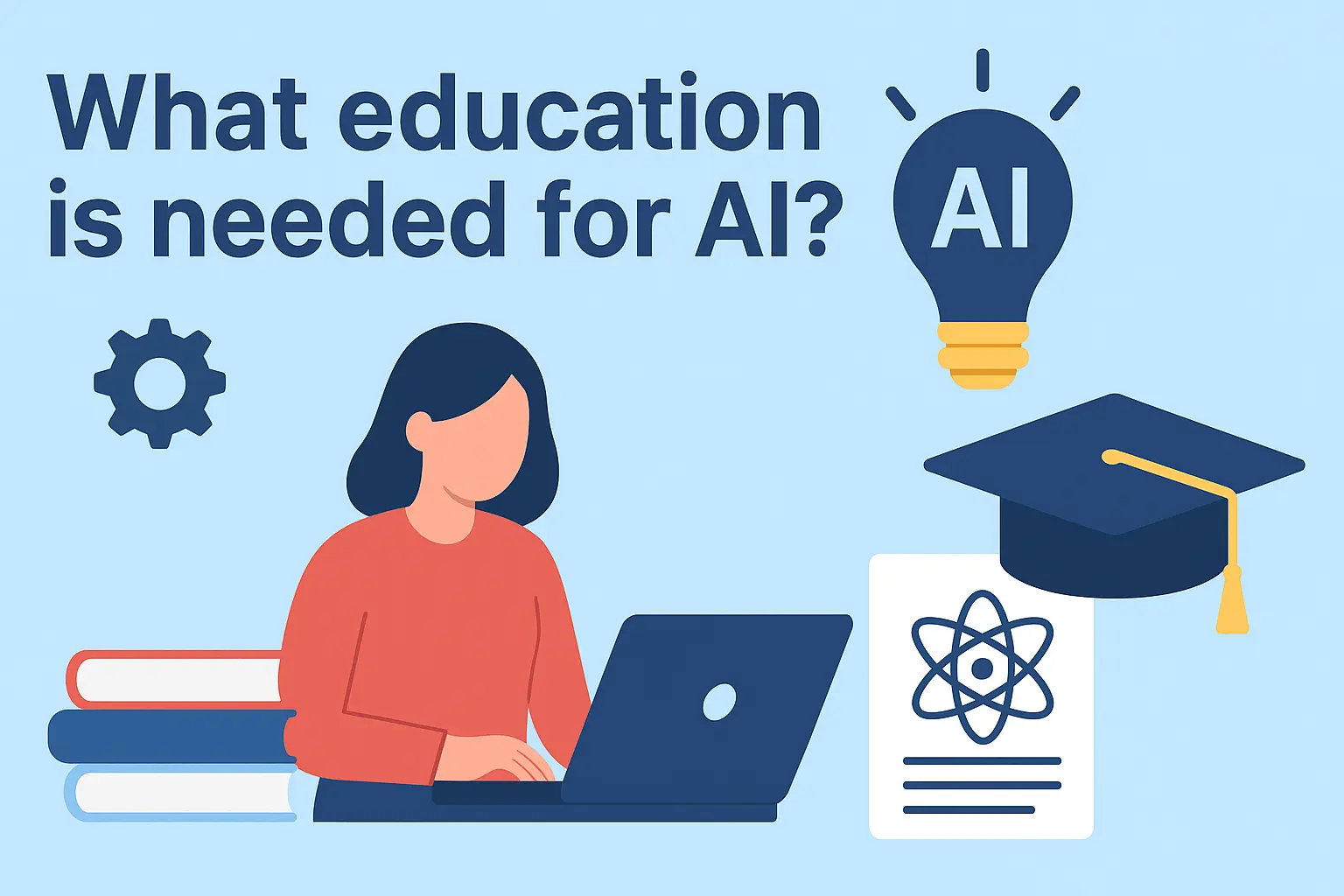Artificial Intelligence (AI) is growing at a very fast pace. The question that many students nowadays are asking is What degree is needed for AI ? It is not a black and white question but it is clear that education is a huge component in developing a strong career in AI.
In this guide, we would discuss the skills, degrees and courses which may help you to enter into this field. We will also address other ways of learning AI in case you do not want to go the traditional college path. By the end of it, you will know what you should know to work in AI and how to get the right path to pursue.

Table of Contents
Why Education Matters in AI
AI is not a single subject. It is a blend of computer science, math and data science. To develop AI systems, all these areas will need skills.
Without relevant education, it is hard to work on AI projects. Companies are looking after people with the capacity to code, perform maths and how machines learn. That is why education is so important.
Degree Requirement in AI: The most favored ones.
They are more likely to think about computer science when they receive questions like, What degree is needed in AI? And this is so, though not the only one. These are the most practical AI degrees.
1. Computer Science
It is the most popular AI degree required. It deals with coding, data format and algorithms. These are the skills to build AI systems. A great number of AI engineers possess this degree.
2. Data Science
A data science degree is one that majors in statistics, data manipulation and machine learning. This level is rather convenient as AI works with large volumes of data. It offers you practical skills of model analysis and training.
3. Mathematics or Statistics
In AI, good math and abilities are a must. Math or statistics majors will provide you with linear algebra, calculus and probability. The functionality of AI models can be learned on these topics.
4. Information Technology
IT degree involves software, databases and networks. Even though it is not AI-focused, it is a good tech base. You can do AI courses later to fill the gap.
5. Engineering
The other students are electrical or computer engineers. These degrees are specialized in hardware, systems and codes. They could be used in the development of AI machines like robots or intelligent systems.

Skills You learn in these Degrees.
The degree that is necessary in AI should equip you with job-relevant skills. Some of the skills that you develop through the above degrees include:
- Coding in Python, Java, or C++
- Data library work with TensorFlow and PyTorch.
Algorithms and problem solving knowledge. - Handling large sets of data
- Applying concepts of math to solve real life problems.
- AI model testing and training.
Do You Need a Master’s Degree?
The question that many students will ask is whether a bachelors degree is enough. It is a question of what you want to accomplish.
Entry-level jobs in AI would require an undergraduate degree. Nevertheless, a master degree comes in handy in research or other senior posts. A master degree offers additional studies in machine learning, natural language processing and computer vision.
Other students obtain a PhD when they want to work in AI research or teaching. Nevertheless, in most professions a bachelors or masters degree is enough.
These are alternative ways of learning AI without a degree.
Not everybody wants to spend years in college. The bright side to it is, there exist alternative methods of learning AI.
Online Courses
AI courses are offered on such platforms as Coursera, Udemy, and edX. The majority of them are developed by major universities. These courses are coding, data and machine learning. You will be in a position to study at your own pace.
Bootcamps
AI bootcamps are short and intensive. They demonstrate to you how to perform the job skills in a few months. They are pleasant when one is in a hurry.
Self-Study
You can also learn AI independently with free resources. The issues of AI are described in a great number of websites, blogs, and YouTube videos. The trick is that it is possible to practice and create little projects.
What Employers Look For
When you apply to AI jobs, employers are not just taking into account your degree. They want to know that you can put into practice what you know. Some of the things that can increase your chances are the following:
- A portfolio of AI projects
- Technology company internship.
- Cloud computing experience with AWS or Google Cloud.
Teamwork and problem solving.
Picking the Right Path
So what is the minimum level of AI? The short answer: computer science or data science is best. But then so do other career options like math, engineering or IT.
You should major in math, coding and problem solving when you are still at school. So when you are in college you need to choose a degree that will equip you with good technical skills. You can still study AI online and self-study even during the time you are at work.
Final Thoughts
The future of work and life is being defined by AI. You have to possess the right education to join it. The extent needed of AI depends on your career goals. The most preferred ones are computer science and data science. Nevertheless, there is a possibility that math, statistics, engineering, and IT will land you into AI as well.
Remember that a degree is just a step. Skills, practice and projects are even more important than education. Keep learning, be interested and you will be able to build a strong future in AI.

Frequently Asked Questions For What education is needed for AI ?
Q1.What degree is needed for AI?
Majority of AI professionals are studying computer science or data science. Degrees in math, IT and engineering also come in handy.
Q2.Is a degree required to work in AI?
Yes. You can study online, boot camp and self-study. One of the most important is a portfolio of projects.
Q3.Am I required to have a master degree in AI?
Not always. Most jobs require a bachelor degree. A masters assists in research or higher position.
Q4.Which skills are the most important to AI?
The most sought after AI career skills are coding, math, data handling, and machine learning.

